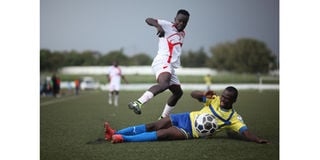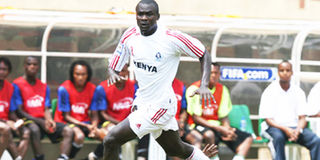Fifa player bans expose rot in Kenyan football

Western Stima's Henry Onyango (in yellow) and Festus Okiring of Kakamega Homeboyz vie for the ball during their Sport Pesa Premier League match at Moi Stadium in Kisumu on December 22, 2018. Okiring was on February 4, 2020 banned by Fifa for match-fixing.
What you need to know:
- Players, coaches and referees go for months without pay, making them easy to lure with bribes
For the second time in less than a year, world football governing body Fifa has unearthed what appears to be an intricate web of manipulation of football matches in Kenya.
And, from these findings, Nation Sport can exclusively reveal how deep-rooted the vice has become with footballers, referees, coaches, club owners and even administrators believed to be on the take.
"We've received two complaints from clubs in the past six months," Kenyan Premier League chief executive officer Jack Oguda confirmed on Wednesday.
"There isn't much evidence to nail the suspects yet but we are still investigating. I am warning all players, officials and referees that match manipulation will get them into big problems."
TURN A BLIND EYE
That it took the intervention of football's world governing body based in Zurich, after reading a report in the Daily Nation last February, to investigate and get to the bottom of these illegal dealings, speaks volumes of how local authorities continue to turn a blind eye to the problem.
On Tuesday, four Kenyan Premier League footballers -- George Mandela, Moses Chikati, Festus Okiring and Festo Omukoto -- were found guilty by Fifa's Disciplinary Committee of “manipulating” matches in the competition last season.
Consequently, Mandela, a Ugandan, was handed a lifetime ban from taking part in all football activities owing to his “central” role in the saga, while his colleagues have been slapped with four-year bans.
This ruling stems from investigations in the wake of concerns raised by Kakamega Homeboyz owner Cleophas Shimanyula in February last year.
The Kakamega-based business tycoon launched internal investigations after his team had failed to win five league matches, losing three of those in a row.
Only to find out his players had been receiving cash to throw away games.
"We've already reported to the police with recorded evidence and written to the federation (Football Kenya Federation) over the same," Shimanyula told Nation Sport at the time. Nation Sport has established a number of players and Ugandan coach Paul Nkata (who fled to his native Kampala when the incident became public) had been receiving significant sums of money, via their mobile phones, and could not account for it.
The cash, to the tune of Sh150,000 per game, was reportedly handed out by a man of Indian origin who is based in Nairobi.
In exchange for the cash, the said person (name withheld) insisted the team concedes two goals in each opening half of a league match and at least three goals in every match.
He didn't care about the final result of each game.
The Homeboyz players, earning an average of Sh40,000 a month, fell for the bait. But the cunning “boss” appeared keen to cover his tracks. He limited his contact with the said players and coach to face to face encounters. Alternatively, he would dispatch a middleman, believed to be a former Harambee Stars player, on the errands.
The ex-international made a number of trips to Kakamega to personally deliver the cash and instructions to the players.
Soon after, he became sloppy and preferred to instead send the money via mobile phone.
Ultimately, it is these phone records that formed part of the evidence that nailed players who failed to account for the money.
But how was the manipulator benefitting from this investment? We don't know yet.
PLACED BETS
Another shocking revelation is investigations by Fifa discovered that these players were placing bets on the same matches they participated in, via their mobile phone.
"I want to thank Fifa for coming all the way to Kakamega to investigate this matter," said Shimanyula.
"I publicly complained, no one listened, I was intimidated instead. Now we all know what is happening."
Another case of match manipulation involves former Harambee Stars defender George Owino, now retired, who was last year banned by Fifa for manipulating matches involving the national team.

Harambee Stars defender George Owino races past Mrisho Ngassa of Tanzania during a past Cecafa Senior Challenge match at Nelson Mandela Stadium in Namboole, Kampala. Owino is serving a 10-year ban by Fifa after he was found guilty of match-fixing claims.
And just last week Wazito owner Ricardo Badoer claimed, via social media, he had been approached by unknown people with claims that his players were giving away matches.
PUBLICLY COMPLAINED
And two seasons ago, then AFC Leopards secretary-general Oscar Igaida confirmed he had scrapped handing out allowances for drawing matches to his players after reports that his players could have been manipulating matches surfaced.
Sofapaka boss Elly Kalekwa, too, has also publicly complained of “suspicious” activities by his players. Last December's 4-1 loss by Kenya to lowly Eritrea in the semis of the Cecafa Senior Challenge Cup in Kampala has also been flagged as a suspicious result.
Kenya conceded three goals in the first half of the game.
Besides, a Kenyan player competing in club continental action was last season offered Sh500,000 to give away a penalty in the opening 10 minutes of the game.
"I am very concerned by this development and we have resolved to insert clauses in the contract of each player warning them of the implications of the vice," added Oguda.
The situation has been made worse by the financial challenges facing the Kenyan Premier League, with several players, coaches, and referees going for months without pay. At times, clubs have been asked to pay the referees who officiate their matches.





